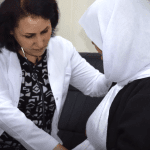In August 2014, ISIS invaded the Yazidi villages of Sinjar in northern Iraq, killing, abducting, and “disappearing” thousands of Yazidi women, men, and children. Dr. Nagham Hasan, a Yazidi activist and gynecologist, has dedicated her life to the Yazidi cause and visits survivors of sexual enslavement and torture at the hands of ISIS in the many camps housing displaced people in order to provide medical and psychological support. “It is not because I’m a doctor; it is because I believe in human rights,” she told PHR. We asked Dr. Hasan how COVID-19 is affecting her community. Below is an extract from our interview.
PHR: What was the situation like in the camps before COVID-19?
Dr. Nagham Hasan: The camps before COVID-19 were in dire shape. People live in overcrowded tents with no electricity or protection from winter storms or excruciating summer heat. Recently, these conditions have been exacerbated by the lack of employment opportunities in the camps. Support by international actors also decreased dramatically after the Iraqi government liberated the city of Mosul from ISIS in 2017. Since then, aid organizations have started to reallocate their resources towards rebuilding and supporting the newly liberated areas. Although they still support the camps, it’s minimal compared to the need.
PHR: How would you describe the level of preparedness for COVID-19 in these camps, on a governmental, institutional, and community level?
Dr. Nagham Hasan: The government established groups to conduct awareness campaigns in the camps – on how the virus is transmitted, how to wash hands, how to maintain social distance, and how to report suspected cases. They also disinfected camps by spraying the tents. Donated sanitary supplies and food packages have been distributed in some of the camps. I still go visit my regular patients in the camps, wearing a mask and gloves. I also coordinate with health clinics there to let me know if there are any critical cases, and I send an ambulance to transport those patients to the hospital for the medical attention they need.
“It is not because I’m a doctor; it is because I believe in human rights.”
I also started a new initiative to sew facemasks from sanitized medical fabric to be distributed in the camps, as well as to first responders. We distributed 500 masks so far. It might seem like a small number, but this is the best we could do so far with the resources we have. Despite all of that, the need far exceeds what has been distributed by all the parties who are currently supporting the camps.
PHR: How are IDPs coping with their new reality?
Dr. Nagham Hasan: Overall, nothing has changed. Since 2014, Yazidi survivors continue to suffer. They suffer from the trauma associated with the crimes ISIS committed against them and their families. They suffer because they don’t know the fate of many of their family members who are still missing. They suffer from waking up every day in small tents in camps where the most basic needs are considered luxuries. Now, they suffer the most from not being able to go back to their homes. I have seen cases of increased sleep disorders, anxiety, and depression that led to suicide. Physically, there are illnesses and conditions that were spreading well before COVID-19 – and the majority have weak immune systems due to malnutrition. Poverty has reached unprecedented levels, since many IDPs have lost their livelihood on account of the lockdown. A family called me the other day complaining that their kids go to sleep hungry every night. On top of all that, they now have to face another layer of trauma imposed by COVID-19, which negatively impacts their already deteriorated physical and psychological health. They live in constant fear and uncertainty of the future.
PHR: What is your biggest fear amid the COVID-19 pandemic?
Dr. Nagham Hasan: My biggest fear is if COVID-19 reaches IDPs who already live in cramped conditions. A combination of crowded camps, lack of resources, and limited awareness campaigns make camps a fertile ground for the spread of the virus. There is no doubt that if one case is found in the camps, thousands could be infected, and it will be difficult to contain the spread of the virus thereafter.
“My biggest fear is if COVID-19 reaches IDPs who already live in cramped conditions.”
PHR: What is needed at this stage to improve the level of preparedness?
Dr. Nagham Hasan: IDPs in general, and Yazidis in particular, must not be forgotten. To protect these people, the government and international organizations must continue to conduct awareness campaigns, to work collaboratively to provide masks, gloves, and hygiene and sanitary supplies, and to make sure all camps are included in the implementation plan. And the government must financially support the IDPs. The battle against this virus is a long one, and I worry that IDPs will not continue to abide to the movement restrictions because they want to work and feed their families.
PHR: What is your hope for the fight against COVID-19?
Dr. Nagham Hasan: This crisis is keeping us physically apart, but in so many places it is bringing out the best of humanity. My hope is that IDPs are integrated in all of the national, regional, and global efforts to combat COVID-19.

